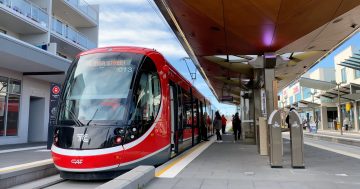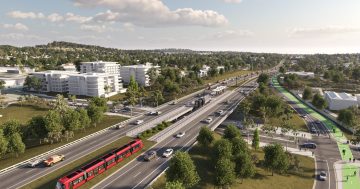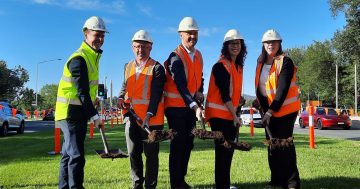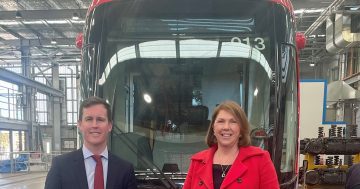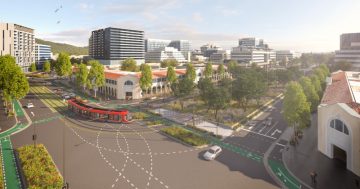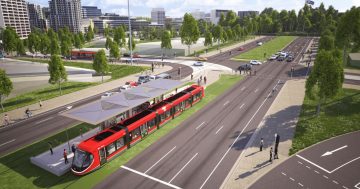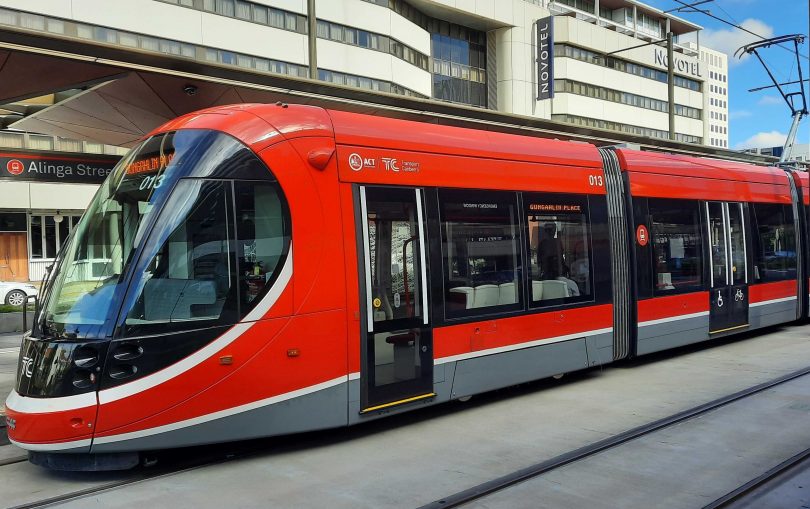
ACT Auditor-General Michael Harris has raised doubts about the economics of extending light rail from Alinga Street to Commonwealth Park. Photo: File.
The cost of the next stage of light rail to Commonwealth Park may have been be underestimated and the project’s economic benefits overstated, according to a new audit report.
ACT Auditor-General Michael Harris also says in the report, ‘Canberra Light Rail Stage 2A: Economic Analysis’, that the demand for public transport may not be the same in the future due to the COVID-19 pandemic changing the way people work, with many to continue working remotely.
The audit found that a significant amount of the $150 million in benefits identified for Light Rail Stage 2A are predicated on the project being a catalyst for the development of the Acton Waterfront, but that neither the Stage 2A Business Case or Economic Appraisal Report provides information or evidence on how it will actually do this.
“Should the Acton Waterfront not be developed as fast as is hoped, then the timing and quantification of the expected benefits of Light Rail Stage 2A are at risk,” said Mr Harris.
The audit also found the economic appraisal was dependent on a series of ‘transformational projects’ and revitalisation activities such as the raising of London Circuit; National Capital Authority (NCA) plans to transform Commonwealth Avenue and Kings Avenue into grand boulevards, and the development of Section 100, next to the ACT Law Courts.
Mr Harris said any failure to implement these projects on a timely basis would have a negative impact on the expected benefits of Light Rail Stage 2A.
The audit found the estimated $162 million cost of the project did not take into account the requirement for wire-free running and retrofitting light rail vehicles.
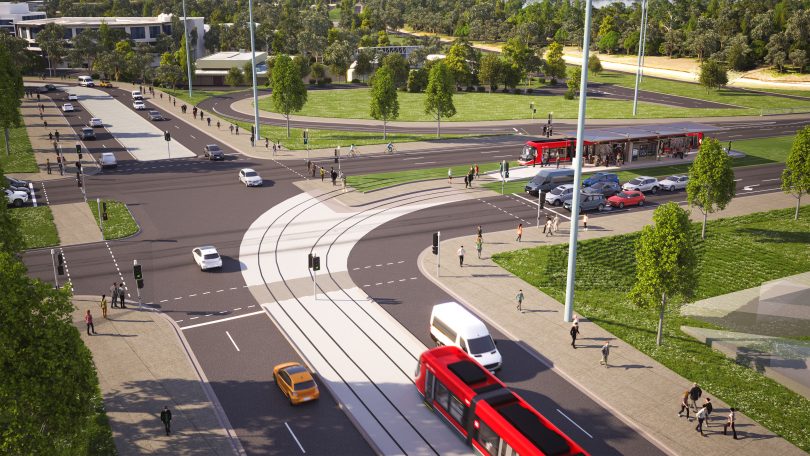
An artist’s impression of the intersection of London Circuit and Commonwealth Avenue on the Light Rail Stage 2A route to Commonwealth Park. Image: ACT Government.
The cost of retrofitting was estimated to be about 17 per cent of the estimated capital cost.
“At the time of the preparation of the Stage 2A Business Case, there was a very strong likelihood that wire-free technology would be required for any extensions towards and through the Parliamentary Zone, but this cost, and other costs associated with urban design finishes, were not explicitly included in the capital cost estimate for Light Rail Stage 2A,” said the report.
The audit said the cost of disruption to businesses along the 1.7km route had also not been taken into account.
The audit recommends that Major Projects Canberra should review and update the economic analysis, including its assumptions and costs and benefits.
This should be made publicly available.
The audit also recommends the ACT Chief Minister, Treasury and Economic Development Directorate work with Major Projects Canberra and the Transport Canberra and City Services Directorate to develop a Benefits Realisation Plan for Light Rail Stage 2A.
An ACT Government spokesperson said the government would be considering the report’s findings closely.
“The report focuses on Stage 2A of Light Rail,” said the spokesperson. “While the Stage 2A extension provides some benefits, the ACT Government’s intention is to maximise the benefits for the city in extending the line from Gungahlin to Woden.
Public Transport Association of Canberra chair Ryan Hemsley said the report highlighted the importance of delivering the full extension of the network, rather than stopping short at Commonwealth Park.
Mr Hemsley said there are concerns the overall project is falling behind schedule with a Works Approval yet to be submitted to the NCA, and the 9km extension to Woden still without a planned opening date.
Last week, the ACT Government announced of early works to relocate utilities and an expression-of-interest process for the raising of London Circuit.
“While last week’s announcements are welcome, a handful of utility relocations and an expression of interest for enabling works does not a project make,” said Mr Hemsley.
He said there was a widening gulf between the ACT Government’s election promises and the actual delivery of infrastructure.
“It may be time to consider whether a dedicated light rail planning and delivery entity, such as the former Capital Metro Agency, can cut through some of the delays and streamline the process for future stages to Belconnen, Tuggeranong, Molonglo, Fyshwick and the airport,” said Mr Hemsley.
He is concerned the delays also risk adding unnecessary costs to the project.
“The longer this stretches out, the harder it will be to secure the necessary construction expertise, which is presently in very high demand across the country,” said Mr Hemsley.
“Canberrans cannot afford to wait until the late 2020s for this much needed public transport infrastructure to be completed.”
The ACT Government has promised that first tracks for Stage 2A will be laid in 2024.
Stage 2B to Woden still has multiple approval hurdles to clear.












